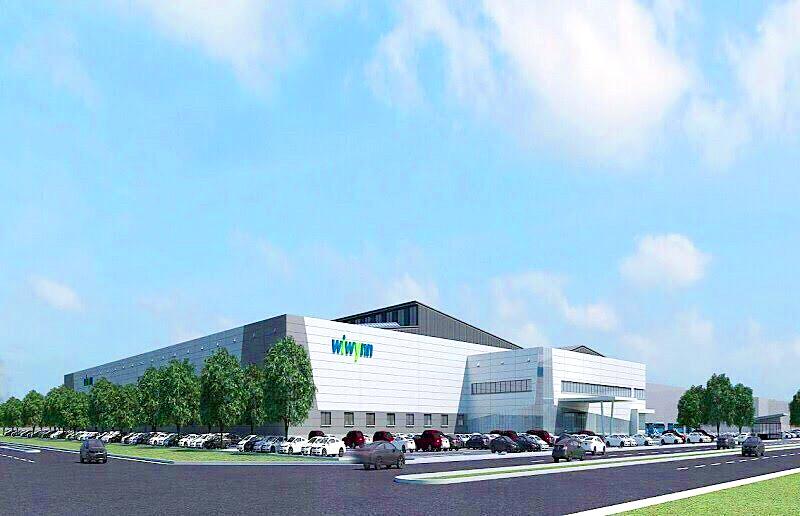Cloud computing equipment company Wiwynn Corp (緯穎科技), which counts Meta Platforms Inc as one of its key customers, is boosting capacity expansion in Malaysia through a new investment of about NT$1.94 billion (US$64.7 million), it said yesterday in a statement filed with the Taiwan Stock Exchange.
The investment, which aims to help the company with business development and strategic arrangements, would be made through subsidiary Wiwynn Technology Services Malaysia Sdn Bhd to build a new factory, Wiwynn said in the filing.
The announcement came about one-and-a-half months after the company started phase II of its new server printed circuit board assembly (PCBA) plant for cloud data centers at the Senai Airport City industrial development in Malaysia’s Johor state.

Photo courtesy of Wiwynn Corp
With the new server PCBA plant, Malaysia would become one of Wiwynn’s manufacturing hubs, providing complete services from PCBA to rack integration to address surging demand from hyperscale data centers, it said.
Wiwynn said it plans to complete phase I construction of the facilities — a server rack integration plant — in the first quarter of next year, followed by the PCBA plant in 2024.
Wiwynn is a subsidiary of notebook computer maker Wistron Corp (緯創), which owns about a 44 percent stake in the server manufacturer.
Wiwynn, based in New Taipei City’s Sijhih District (汐止), posted a record-high net profit of NT$3.56 billion last quarter, a 54.3 percent increase from NT$2.31 billion in the second quarter last year, the company said in a statement released earlier this month.
Earnings per share rose to NT$20.38 last quarter, up from NT$13.2 a year ago.
Revenue soared 46.62 percent to a record high NT$75.06 billion during the quarter ending on June 30, compared with NT$51.29 billion in the same period last year.
Wiwynn expected the growth momentum for cloud-based data centers to extend into the second half of the year, as companies accelerate digital transformation and adopt artificial intelligence applications, the statement said.
The company said it would continue investing in expanding capacity in Taiwan, North America and Southeastern Asia in response to market uncertainty and supply chain risks.
The company is also seeking closer collaboration with customers and supply chain suppliers to maintain resilient operations, it added.

TAKING STOCK: A Taiwanese cookware firm in Vietnam urged customers to assess inventory or place orders early so shipments can reach the US while tariffs are paused Taiwanese businesses in Vietnam are exploring alternatives after the White House imposed a 46 percent import duty on Vietnamese goods, following US President Donald Trump’s announcement of “reciprocal” tariffs on the US’ trading partners. Lo Shih-liang (羅世良), chairman of Brico Industry Co (裕茂工業), a Taiwanese company that manufactures cast iron cookware and stove components in Vietnam, said that more than 40 percent of his business was tied to the US market, describing the constant US policy shifts as an emotional roller coaster. “I work during the day and stay up all night watching the news. I’ve been following US news until 3am

Six years ago, LVMH’s billionaire CEO Bernard Arnault and US President Donald Trump cut the blue ribbon on a factory in rural Texas that would make designer handbags for Louis Vuitton, one of the world’s best-known luxury brands. However, since the high-profile opening, the factory has faced a host of problems limiting production, 11 former Louis Vuitton employees said. The site has consistently ranked among the worst-performing for Louis Vuitton globally, “significantly” underperforming other facilities, said three former Louis Vuitton workers and a senior industry source, who cited internal rankings shared with staff. The plant’s problems — which have not

TARIFF CONCERNS: The chipmaker cited global uncertainty from US tariffs and a weakening economic outlook, but said its Singapore expansion remains on track Vanguard International Semiconductor Corp (世界先進), a foundry service provider specializing in producing power management and display driver chips, yesterday withdrew its full-year revenue projection of moderate growth for this year, as escalating US tariff tensions raised uncertainty and concern about a potential economic recession. The Hsinchu-based chipmaker in February said revenues this year would grow mildly from last year based on improving supply chain inventory levels and market demand. At the time, it also anticipated gradual quarter revenue growth. However, the US’ sweeping tariff policy has upended the industry’s supply chains and weakened economic prospects for the world economy, it said. “Now

COLLABORATION: Given Taiwan’s key position in global supply chains, the US firm is discussing strategies with local partners and clients to deal with global uncertainties Advanced Micro Devices Inc (AMD) yesterday said it is meeting with local ecosystem partners, including Taiwan Semiconductor Manufacturing Co (TSMC, 台積電), to discuss strategies, including long-term manufacturing, to navigate uncertainties such as US tariffs, as Taiwan occupies an important position in global supply chains. AMD chief executive officer Lisa Su (蘇姿丰) told reporters that Taiwan is an important part of the chip designer’s ecosystem and she is discussing with partners and customers in Taiwan to forge strong collaborations on different areas during this critical period. AMD has just become the first artificial-intelligence (AI) server chip customer of TSMC to utilize its advanced